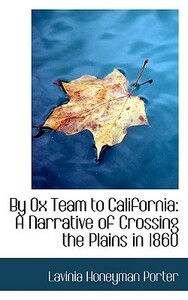Take a photo of a barcode or cover
3 reviews for:
By Ox Team to California: A Narrative of Crossing the Plains in 1860
Lavinia Honeyman Porter
3 reviews for:
By Ox Team to California: A Narrative of Crossing the Plains in 1860
Lavinia Honeyman Porter
adventurous
challenging
informative
inspiring
reflective
slow-paced
"These rude graves were sometimes covered with a pile of stones. Others bore a headboard on which was rudely cut the name of him who lay beneath. For them no weeping willow sighed a sad requiem nor enfolded their lowly mounds with its tender, swaying branches. No marble shaft praised their deeds or told their fame. No flowers rare and sweet rested on the unconsecrated soil. But the horned toad and lizard glided beneath the growth of scanty weeds. Those lying here were lonely now, deserted by the loved ones whose bleeding hearts had been forced to leave them at rest beneath the bitter soil."
Poignantly writes Lavinia Honeyman Porter in her memoir of crossing the plains to California in 1860, of the many graves that they witnessed along the way and how difficult it must have been to leave a loved one behind in the wilderness. This is my fourth memoir of a woman in the west in the 19th century in the past month and they have all been really good, fascinating books. Mrs. Porter wrote this one many decades after her trip, but still managed to present a vivd account of the crossing. Some things that stood out:
1. Number one by far is that Mrs. Porter and her husband and brother (for half the journey) went almost the entire trip BY THEMSELVES!?! This is perhaps the single dumbest thing I've read of a pioneer family doing because of the danger from Indians. Marion Russell in her book "Land of Enchantment" recounts how one family of three (couple and son) had a falling out with the wagon master and ended up turning back to Texas by themselves against the repeated warnings of the wagon leader. The Comanches unsurprisingly caught the trio, had the father watch as they murdered and scalped his son, then murdered and scalped him in front of his wife (who was something like 16) before taking her captive as a slave. This is what happened to people who traveled by themselves. Mrs. Porter admits their naïveté many times, but wow, I still can't believe they traveled 2000 miles mostly by themselves and were never attacked. As Mrs. Porter says, providence was definitely with them.
2. A funny anecdote. Mrs. Porter who admits she grew up as a southern belle, had never cooked at meal at all before they set off on their trip to California. Her cooking was not very good at first. She writes: "The bread-making at first was a total failure. When I attempted to make light rolls for breakfast they were leaden. My husband, wise man that he was, ate them in silence, but my humorous brother, less polite, called them sinkers."
3. The sheer drudgery of the journey. Mrs. Porter draws an excellent picture of just the sheer difficulty of going day after day 15-25 miles walking most of the mileage and the vast distances across the prairies and deserts. It definitely does not come off as a romantic journey at all. It was difficult. It was long. It was not fun. And Mrs. Porter is pregnant for the whole journey! They arrive in California and two weeks later she has a baby. Amazing woman.
Good, fascinating read about the tenacity it took for these pioneers to cross 2/3 of America in a covered wagon.
Poignantly writes Lavinia Honeyman Porter in her memoir of crossing the plains to California in 1860, of the many graves that they witnessed along the way and how difficult it must have been to leave a loved one behind in the wilderness. This is my fourth memoir of a woman in the west in the 19th century in the past month and they have all been really good, fascinating books. Mrs. Porter wrote this one many decades after her trip, but still managed to present a vivd account of the crossing. Some things that stood out:
1. Number one by far is that Mrs. Porter and her husband and brother (for half the journey) went almost the entire trip BY THEMSELVES!?! This is perhaps the single dumbest thing I've read of a pioneer family doing because of the danger from Indians. Marion Russell in her book "Land of Enchantment" recounts how one family of three (couple and son) had a falling out with the wagon master and ended up turning back to Texas by themselves against the repeated warnings of the wagon leader. The Comanches unsurprisingly caught the trio, had the father watch as they murdered and scalped his son, then murdered and scalped him in front of his wife (who was something like 16) before taking her captive as a slave. This is what happened to people who traveled by themselves. Mrs. Porter admits their naïveté many times, but wow, I still can't believe they traveled 2000 miles mostly by themselves and were never attacked. As Mrs. Porter says, providence was definitely with them.
2. A funny anecdote. Mrs. Porter who admits she grew up as a southern belle, had never cooked at meal at all before they set off on their trip to California. Her cooking was not very good at first. She writes: "The bread-making at first was a total failure. When I attempted to make light rolls for breakfast they were leaden. My husband, wise man that he was, ate them in silence, but my humorous brother, less polite, called them sinkers."
3. The sheer drudgery of the journey. Mrs. Porter draws an excellent picture of just the sheer difficulty of going day after day 15-25 miles walking most of the mileage and the vast distances across the prairies and deserts. It definitely does not come off as a romantic journey at all. It was difficult. It was long. It was not fun. And Mrs. Porter is pregnant for the whole journey! They arrive in California and two weeks later she has a baby. Amazing woman.
Good, fascinating read about the tenacity it took for these pioneers to cross 2/3 of America in a covered wagon.
adventurous
medium-paced


